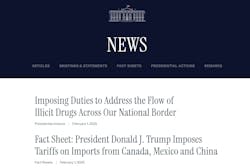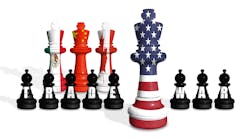Editor's Note: President Trump, Mexican President Claudia Sheinbaum and Canadian Prime Minister Justin Trudeau have agree to one-month pauses on the tariff implementation, following calls on Monday.
President Donald Trump announced broad tariffs Saturday on major US trading partners Canada, Mexico and China, invoking emergency economic powers to do so while citing a “major threat” from illegal immigration and drugs.
He invoked the International Emergency Economic Powers Act in imposing the tariffs, with the White House saying “the extraordinary threat posed by illegal aliens and drugs, including deadly fentanyl, constitutes a national emergency.”
More on Trump and Tariffs
Donald Trump made imposing new, steep tariffs on trading partners a major part of his presidential run in 2023 and 2024.
The aim is to hold all three countries “accountable to their promises of halting illegal immigration and stopping poisonous fentanyl and other drugs from flowing into our country,” the White House added.
Washington additionally accused Mexico’s government of having an “intolerable alliance” with drug trafficking groups.
Mexican President Claudia Scheinbaum rejected that accusation on social media, saying Mexico will retaliate with trade actions of its own.
“We categorically reject the slander made by the White House against the Mexican government about alliances with criminal organizations,” Sheinbaum wrote. “If there is such an alliance anywhere, it is in the U.S. gun shops that sell high-powered weapons to these criminal groups.”
She added that Mexico has a “Plan B” in place to impose tariffs and non-tariff measures on U.S. trade.
Canadian Prime Minister Justin Trudeau said on social media that he’s been in touch with Scheinbaum and will also be responding to U.S. action soon.
“We did not want this, but Canada is prepared,” Trudeau wrote. During a televised address to Canadians shortly after that statement, he added that Canada will enact its own counter-tarrifs and non-tariff actions against the United States on Tuesday.
Opening Salvo
The announcement threatens upheaval across supply chains, from energy to automobiles to food. Trump has repeatedly expressed his love for tariffs, and has signaled that Saturday’s action could be the first volley in further trade conflicts to come.
This week, he pledged to impose duties on the European Union in the future. He has also promised tariffs on semiconductors, steel, aluminum, as well as oil and gas.
“Tariffs are a powerful, proven source of leverage for protecting the national interest,” the White House said.
Trump, in Florida for the weekend, wrote on social media, “We need to protect Americans, and it is my duty as President to ensure the safety of all.”
“The tariff action announced today makes clear that our friends, neighbors and Free Trade Agreement partners are in the line of fire,” said Wendy Cutler, vice president at the Asia Society Policy Institute and a former U.S. trade negotiator. “The move today is an opening salvo on the tariff front.”
She noted that Canada and Mexico will face domestic pressure to retaliate.
Economic integration between the United States, Mexico and Canada – who share a trade pact – means stiff tariffs will have “a strong and immediate impact” in all three countries, she said.
Imposing sweeping tariffs on the three biggest US trading partners in goods carries risks for Trump, who won November's election partly due to public dissatisfaction over the economy.
Higher import costs would likely “dampen consumer spending and business investment,” said EY chief economist Gregory Daco.
He expects inflation would rise by 0.7% in the first quarter this year with the tariffs, before gradually easing.
“Rising trade policy uncertainty will heighten financial market volatility and strain the private sector, despite the administration's pro-business rhetoric,” he said.
Economists also expect growth to take a hit.
Trump’s supporters have downplayed fears that tariffs would fuel inflation, with some suggesting his planned tax cuts and deregulation measures could boost growth instead.
U.S. Senate Minority Leader Chuck Schumer has warned new tariffs could “further drive up costs for American consumers.”
Canada and Mexico are major suppliers of U.S. agricultural products. The tariffs are also expected to hit the auto industry hard, with automakers and suppliers producing components throughout the region.
Analysts have warned that hiking import taxes on crude oil from countries like Canada and Mexico threaten U.S. energy prices too. Nearly 60% of US crude oil imports are from Canada, noted a Congressional Research Service report.
© Agence France-Presse
About the Author
Agence France-Presse
Copyright Agence France-Presse, 2002-2025. AFP text, photos, graphics and logos shall not be reproduced, published, broadcast, rewritten for broadcast or publication or redistributed directly or indirectly in any medium. AFP shall not be held liable for any delays, inaccuracies, errors or omissions in any AFP content, or for any actions taken in consequence.


